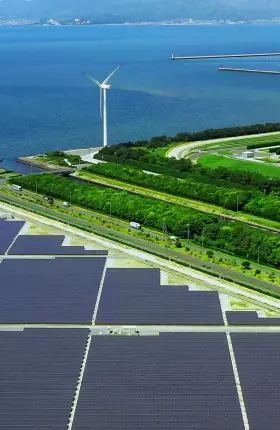Companies have a major opportunity to move from providing clean energy solutions that customers think they should buy to creating compelling products and services that customers will want to buy.
Featured Insights
C-Suite Agenda

Article
September 6, 2023
Achieving net zero will require driving an energy transition with unprecedented speed. That transition promises to have far-reaching implications.

Slideshow
September 24, 2024
To prepare for tomorrow’s global energy system, players need to understand how power market dynamics are evolving today.
Video
October 17, 2024
Exelon’s Calvin Butler on Leading the Energy Transition
Appointing a leadership team is often one of the first challenges facing a CEO. And it’s important strategically, culturally, and operationally. In this episode of CEO Moments of Truth, Exelon’s Calvin Butler shares his thoughts about choosing the right people to help lead the firm through a period of intense change. This includes finding the people who will step up during tough times.
Cost, Resilience, and Value Creation

Report
February 19, 2025
Electricity grid companies are embarking on a once-in-a-generation task to build the infrastructure needed to provide society with clean, secure, and affordable energy.

Article
April 1, 2025
Some refiners have already moved aggressively and produced big savings. Others have been slower to address inefficiencies.

Article
December 3, 2024
Discover insights on energy trading strategies, market dynamics, and capabilities driving Asia-Pacific utilities to navigate change and emerge as global trading leaders.

Slideshow
June 20, 2024
Companies with the highest shareholder returns effectively managed capital allocation tradeoffs between reinvestment decisions, shareholder payouts, and balance sheet improvements.
Subscribe to our Energy E-Alert.
Innovation and Technology

Article
January 20, 2025
Data centers are booming, but power, supply chain, and sustainability challenges threaten growth. Here’s how companies can surmount the obstacles and meet the growing thirst for computing power.

Article
December 2, 2024
With AI and GenAI applications poised to revolutionize the oil and gas industry, companies must develop the capabilities to quickly and flexibly adopt these new technologies.

Article
November 8, 2024
AI development is fueling a surge in energy demand, threatening net zero commitments. By working together, CEOs across industries can keep both transformations on track.

Article
September 19, 2024
Four major barriers stand between emerging climate technologies and adoption at scale. Here’s how earlier pioneering technologies—wind, CCGT, renewables, LNG, and solar—overcame them.
The Future of Low Carbon Solutions

Article
February 20, 2025
Oil and gas companies have a major opportunity to build low-carbon businesses. BCG research finds that they’re developing smart strategies to overcome challenges and lead the energy transition.

Article
June 24, 2024
BCG’s recent report outlines five ways to encourage removal of residual CO2 emissions, a critical factor in achieving global targets to curtail climate impacts.

Article
July 26, 2024
As a climate mitigation tool, recycling captured carbon—rather than storing it—is attracting growing interest. But how viable is it?

Article
September 28, 2023
These novel approaches accelerate the timelines of large projects while reducing costs and risks.
Industry Solutions
Video
January 29, 2025
AI Is Pulling the Technology and Energy Sectors Closer Together
As AI investments soar, so do energy demands. BCG’s Vaishali Rastogi and Pattabi Seshadri discuss the deepening relationship between the technology and energy sectors.

Report
July 4, 2024
Facing a perfect storm, the offshore wind industry must pivot to efficient O&M. PEAK Wind and BCG reveal seven key indicators to future-proof the industry’s success through O&M.

Article
April 23, 2024
Successful developers and investors take into account market differences. But they also rely on five factors that hold true across the region.

Update
July 10, 2024
These are some of the key signposts to look for when considering different scenarios for future oil demand.
Expert Interviews

Article
January 31, 2024
Green hydrogen will radically change how we power the planet–and the Nordics are frontrunners.
Video
September 12, 2024
Transforming an Energy Retailer
Discover how Ergon Energy Retail, an Australian utility, is transforming its business to provide sustainable and dependable energy.
Video
October 27, 2023
Mike Boots, executive vice president of Breakthrough Energy, discusses the importance of supporting climate tech companies through every stage of the innovation cycle.
Video
May 6, 2024
The Danish startup, a leading biomethane producer, employs an innovative energy-cluster concept to meet local needs—and is planning a global expansion.











